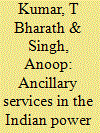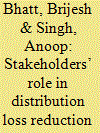|
|
|
Sort Order |
|
|
|
Items / Page
|
|
|
|
|
|
|
| Srl | Item |
| 1 |
ID:
177330


|
|
|
|
|
| Summary/Abstract |
Reliable and secure operation of a power system depends on the ability of system operation to address system imbalances on account of demand-supply imbalances and that an account of change in availability of transmission network elements. The impact of a power plant or transmission line failures causes a short-term imbalance between generation and demand, and balance can be addressed by deploying flexible reserves and ancillary services. The system imbalances in the Indian power system operation are addressed through Deviation Settlement Mechanism, a commercial mechanism based on a frequency linked incentive/penalty structure. Implementation of reserve regulation ancillary services in India has further helped to address deviation in frequency, congestion, and to bring grid resilience. This paper discusses the development of ancillary services in India, alongside crucial developments in the power market. Given the ongoing developments in the Indian power market and international experiences, this paper suggests a road map for further development of the ancillary services market in the country. The Indian power system has also witnessed a significant growth of variable renewable energy resources. In the future, renewable resources are expected to provide full range ancillary services ensuring the least cost, supply security, and high availability of reserves. Deviations on account of uncertainty associated with renewable resource generation are also subject to Deviation Settlement Mechanism, although with lenient penalties.
|
|
|
|
|
|
|
|
|
|
|
|
|
|
|
|
| 2 |
ID:
171433


|
|
|
|
|
| Summary/Abstract |
Reduction of distribution losses is the key to sustainability of entire Indian power sector. Although sufficient emphasis has been placed on adoption of distribution loss reduction technologies (LRT) such as high voltage distribution system, it has not made significant inroads. Building on new institutional economics and sociological approaches, we propose actor analysis as a prerequisite for understanding barriers to technology adoption. The approach emphasizes understanding of action situations and power, interests and interdependencies of involved actors for LRT adoption. Using the method of stakeholder analysis, the study identifies key actors and their interdependencies in LRT adoption processes. The paper concludes that loss reduction and LRT adoption policies can be effectively implemented by engaging consumers through information sharing and, by showcasing advantages of LRT projects especially those leading to improvement in quality of electricity supply.
|
|
|
|
|
|
|
|
|
|
|
|
|
|
|
|
| 3 |
ID:
097262


|
|
|
|
|
| Publication |
2010.
|
| Summary/Abstract |
The initial phase of reforms in the Indian power sector was primarily aimed at bringing regulatory reforms and unbundling of the vertically integrated State Electricity Boards (SEBs). Enactment of the Electricity Act 2003 led to deepening of the reform process by dismantling this monopoly in the power sector. Primary issues emerging on account of transition from a single-buyer model to a multi-buyer multi-seller model include, among others, policy and regulatory initiatives related to open access, power exchanges, and transmission allocation and its pricing. The paper provides an overview of the status of competition in various segments of the power sector. It also reviews the phased program for open access outlined by various State Electricity Regulatory Commissions, including their status and impact on competition. The paper highlights a number of residual issues for the wholesale and retail competition, and also discusses the approach to address the same. These include liberalization of fuel markets, market monitoring, unbundling of retail tariffs, universal service obligation, supplier of last resort and demand response.
|
|
|
|
|
|
|
|
|
|
|
|
|
|
|
|
|
|
|
|
|